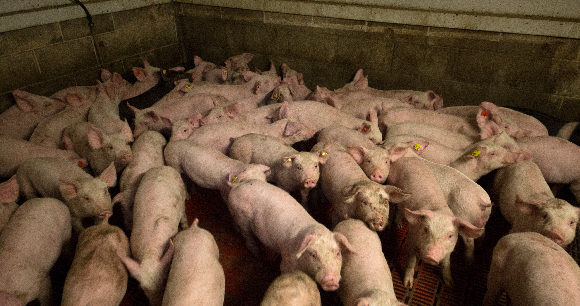
Wisconsin leads nation in barn fires, according to 2018 AWI analysis
Washington, DC—The Animal Welfare Institute (AWI) is dismayed to learn that 4,000 pigs perished Wednesday at Holden Farms in Naples, Wisconsin. While we are relieved that no humans were injured in this fire, the horrible manner in which these animals died remains a terrible tragedy. It is, unfortunately, all too common for a barn fire of this scale to result in such a massive loss of animal lives.
Animals in large-scale farms are trapped and have no way to escape from fast-moving, deadly fires. They endure agonizing deaths as they struggle helplessly to escape, but inevitably succumb to the fire.
More than 150,000 farm animals perished in potentially preventable barn fires in the United States in 2018, according to a recent AWI analysis of media reports. Of the 148 barn fires tracked in 2018—nearly double the number documented one year prior—Wisconsin reported the most fires (19), followed by Ohio (18) and New York (18). AWI calls on the Wisconsin Department of Agriculture and the State Fire Marshal to prioritize barn fire safety awareness and provide barn fire prevention resources to farmers.
Farming operations have a responsibility to consumers and the animals they raise to prioritize animal welfare, and that should include protecting farm animals from barn fires. Considering that large-scale facilities often contain hundreds of thousands of animals, the magnitude of loss can be staggering, as it was at Holden Farms. Fire deterrents should be implemented in large-scale farming facilities to prevent these animals from being burned alive in a matter of hours or even minutes.
Regardless of the size of the facility or how it was constructed, there is always an option for barn fire prevention. Installing fire sprinklers or smoke and carbon monoxide detection systems, placing extinguishers strategically throughout the building, conducting annual fire inspections, and providing ongoing employee training are all examples of fire prevention and suppression methods that could stop or slow the outbreak of a fire and potentially spare thousands of farm animals from suffering.
“Wisconsin already has one of the worst track records in the country for devastating barn fires,” said Alicia Prygoski, farm animal policy associate for AWI. “Simple fire prevention measures and a commitment from state and industry leaders can help solve this problem.”
Margie Fishman, (202) 446-2128, [email protected]